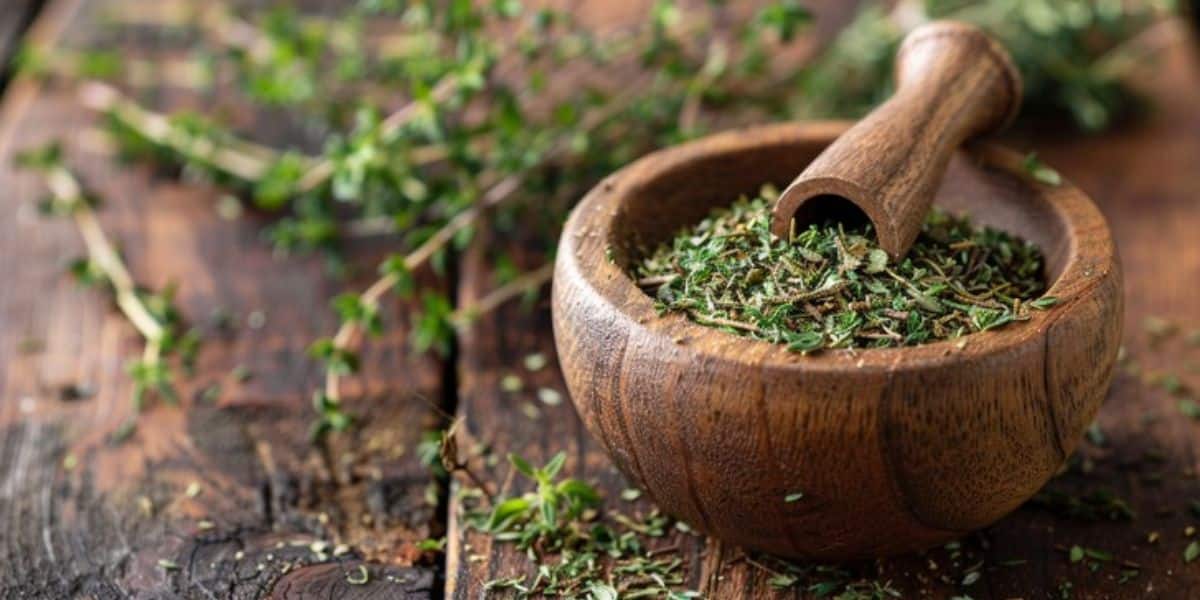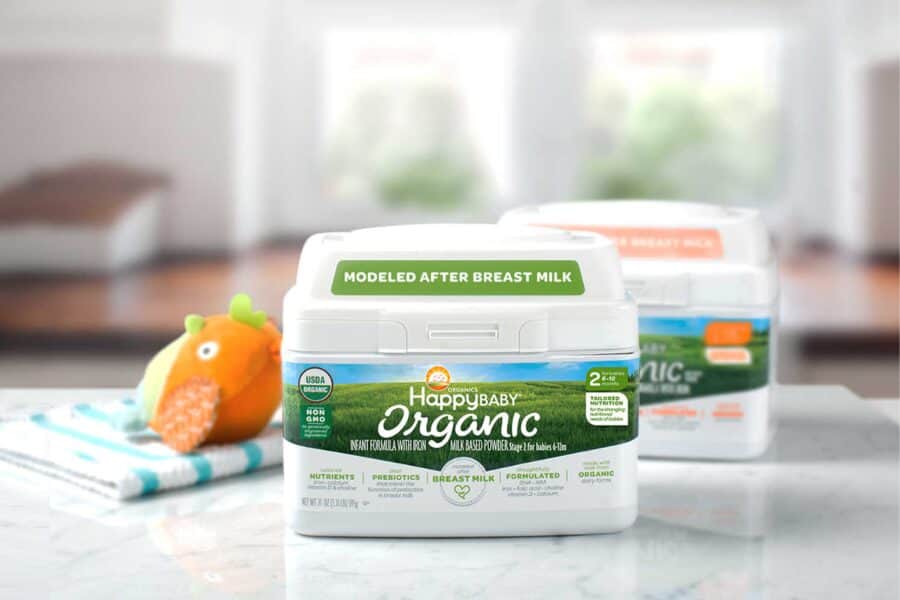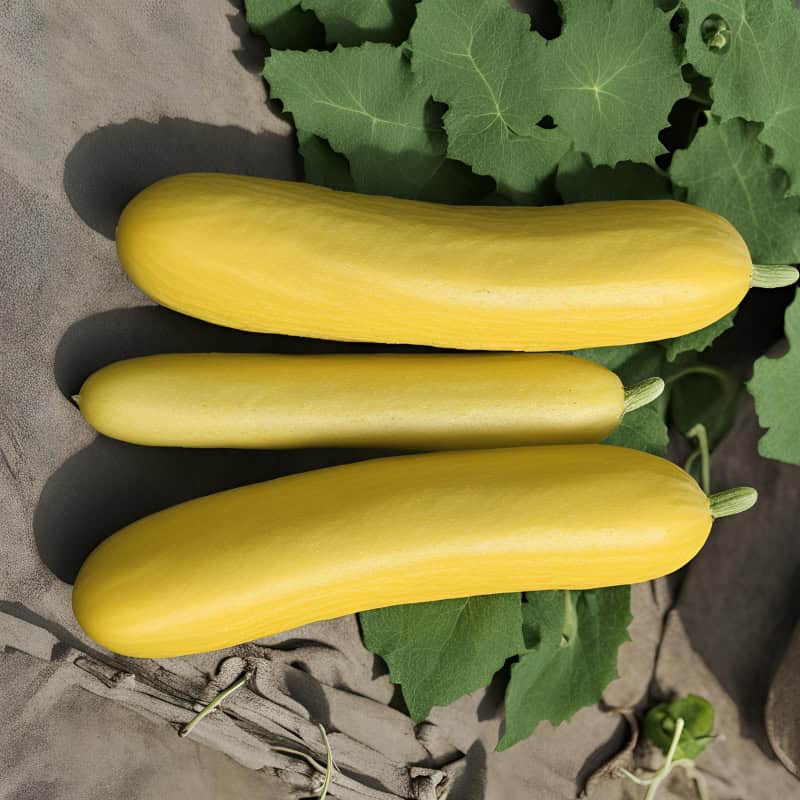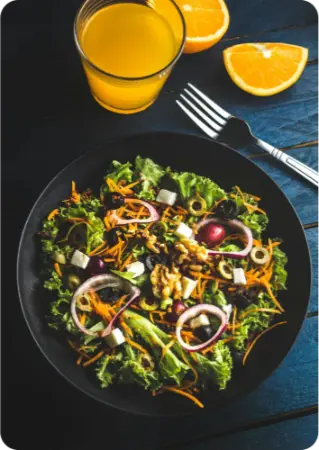Can chickens eat grapes or other sugary fruits? It’s a question for the ages. After all, it’s delightful to watch your flock forage and peck at every little chunk of food that comes their way. This behavior is a sign that your chickens are happy and healthy, which is what every poultry enthusiast aims for. However, not everything is safe for chickens to eat, so as a responsible chicken owner, you need to be careful about what you feed them.
Take grapes, for example. They are easily available, nutritious, and delicious. But can chickens eat grapes? Will they enjoy them as much as you do? More importantly, are grapes safe and healthy for your feathered friends?
The answer is yes, chickens can eat grapes, but there are some guidelines to follow to ensure their safety and comfort.
By the end of this article, you’ll have a clear understanding of the nutritional benefits of grapes for chickens, potential risks, and best practices for incorporating them into your flock’s diet sustainably. With this knowledge, you can confidently provide your chickens with a safe and enjoyable treat that will keep them happy and healthy.
Can Chickens Eat Grapes?

Yes, chickens can eat grapes, but in moderation. Let’s clear one thing out of the way: Grapes are not toxic to chickens. They make for a refreshing treat every once in a while. However, it’s essential to understand how to feed them properly to avoid potential health risks.
In the next section, let’s look into the nutritional benefits of grapes for chickens, answering the question: can I give grapes to chickens and are grapes safe for chickens?
Also Read: Can Chickens Eat Onions?
Nutritional Benefits of Grapes for Chickens
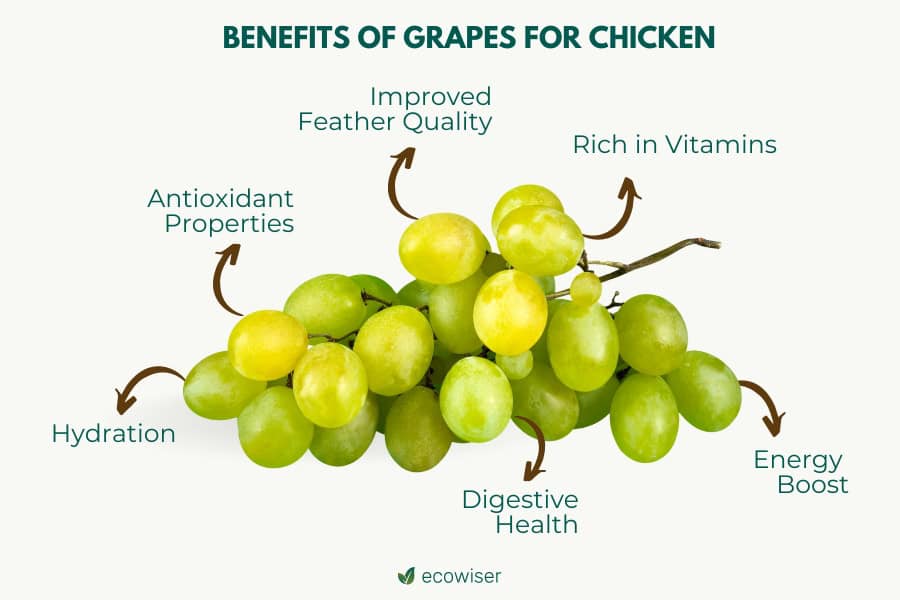
Here’s why grapes are good food for chickens and a valuable addition to their diet.
1. Good nutritional content: Grapes are packed with essential nutrients that can benefit your chickens. They contain vitamins such as vitamin C and vitamin K, as well as important minerals like potassium and copper.
2. Good for the immune system: Feeding grapes to chickens can boost their immune system due to the antioxidants present in the fruit. These antioxidants also help protect cells from damage.
3. Rich in vitamins and minerals: The vitamins and minerals like potassium and copper in grapes contribute to overall health, aiding in bone strength, blood clotting, and cardiovascular health.
Some chicken owners have noticed that their chickens appear more energetic and healthy when grapes are included as an occasional treat.
Now that we know the nutritional benefits, let’s explore how grapes affect chickens in various aspects, including their behavior and digestion.
Also read,
How Grapes Affect Chickens?
Grapes are known to have a positive effect on chickens. Let’s see some of those to clear the air around: Are grapes safe for chickens?
1. Behavioral Impact
Chickens often enjoy the taste of grapes, which can make feeding time more engaging. Offering grapes can stimulate natural foraging behavior, keeping chickens active and mentally stimulated.
2. Digestive Health
While grapes can aid digestion due to their fiber content, overfeeding can lead to digestive problems. It’s important to introduce grapes gradually and monitor your chickens for any signs of discomfort or digestive upset.
3. Energy Levels
The natural sugars in grapes can provide a quick energy boost. This can be beneficial for chickens, especially during colder months when they need extra energy to stay warm. However, it’s crucial to balance this with their regular diet to prevent excessive sugar intake.
Understanding these effects helps us determine the appropriate serving size and frequency for feeding grapes to chickens, which we’ll cover next.
Recommended Serving Size and Frequency

How many grapes can I give to my chickens to eat? If that’s what bothers you, always control the portion size and feeding frequency, along with a balanced diet. Here are a few key points about these:
1. Portion Control
A good rule of thumb is to feed your chickens grapes in small quantities. For example, offering each chicken a few small pieces of grape (cut to avoid choking hazards) once or twice a week is sufficient.
2. Feeding Frequency
Grapes should be considered a treat rather than a staple in your chickens’ diet. Feeding them grapes once or twice a week ensures they get the benefits without overloading on sugars or upsetting their balanced diet.
3. Balanced Diet
It’s essential to maintain a varied diet for your chickens. Alongside grapes, their diet should primarily consist of grains, seeds, insects, and commercial poultry feed that provides all the necessary nutrients.
Next, we’ll discuss the potential risks of overfeeding grapes and how to recognize signs of overconsumption.
Also Read: Can Chickens Eat Bananas?
Potential Risks of Overfeeding Grapes

Yes, chickens can eat grapes! But in small amounts and intermittently. To avoid overfeeding grapes to chicken flocks, learn about the potential side effects of overfeeding grapes on chickens.
1. Health Risks
Overfeeding grapes can lead to several health issues in chickens. Excessive sugar intake from too many grapes can cause obesity, which in turn can lead to other health problems such as fatty liver disease.
2. Signs of Overconsumption
Watch for symptoms like diarrhea, lethargy, or changes in behavior. These could indicate that your chickens are consuming too many grapes. If you notice these signs, reduce the amount of grapes you are feeding them and consult with a veterinarian if symptoms persist.
3. Long-term Effects
Regularly overfeeding grapes can have long-term consequences on your chickens’ health, including chronic digestive issues and metabolic problems. It’s crucial to keep treats in moderation and focus on a balanced diet.
Having understood the risks, let’s move on to best practices for feeding grapes to chickens, ensuring their safety and health.
Best Practices for Feeding Grapes to Chickens
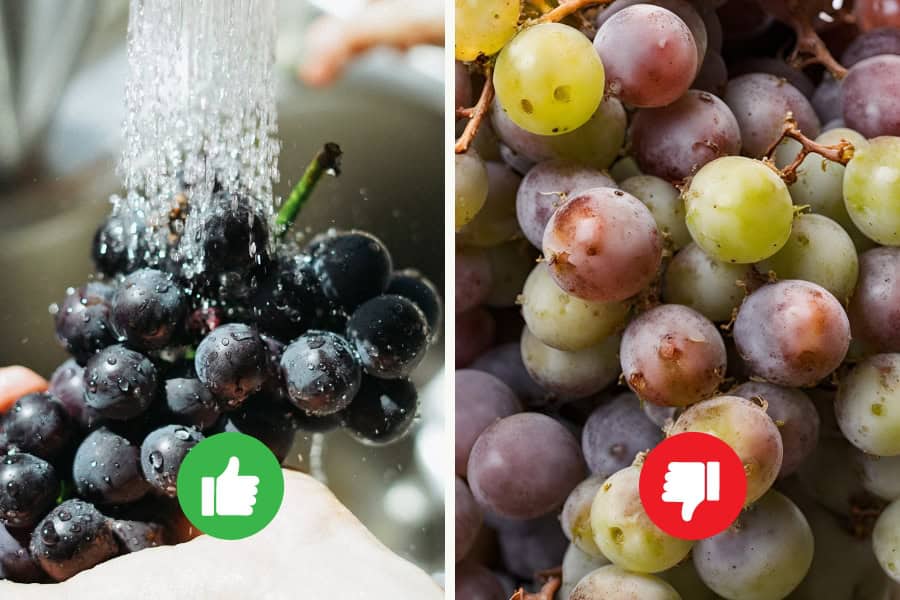
It’s easier to just throw grapes over to chickens in their pens. But it’s not at all safe. Follow these best practices to safely feed grapes to chickens.
- Wash grapes thoroughly: Remove any pesticide residues by washing grapes under running water.
- Cut large grapes: Cut large grapes into smaller pieces to prevent choking hazards.
- Spread out grapes: Spread out grapes in the yard so that all chickens have a chance to enjoy them.
- Avoid mixing with feed: Never mix fresh grapes into chicken feed, as they can cause the feed to spoil.
- Avoid moldy grapes: Avoid feeding moldy or rotten grapes to your chickens.
Tips for Feeding Grapes to Chickens

As a chicken owner, it’s common to wonder: can chickens eat whole grapes, or mix them in their feed? Well, let’s clear your dilemma about it and more such queries with these tips.
- Start with small amounts: Begin with a small number of grapes and gradually increase the amount based on your chickens’ response.
- Monitor for signs of overfeeding: Watch for signs of overfeeding, such as diarrhea, and adjust the serving size accordingly.
- Choose the right grapes: Opt for seedless grapes, as the seeds can be a choking hazard.
- Provide a variety of treats: Offer a variety of treats, including fruits and vegetables, to ensure a balanced diet.
While grapes can be a delightful treat, it’s good to have a variety of fruits in your chickens’ diet. Let’s explore some other fruits that are safe and beneficial for chickens, as well as those that should be avoided.
Alternative Fruits for Chickens

What food is good for chickens? Well, apart from grains and vegetables, there are a few fruits that are healthy for chickens and a few that must be avoided. Let’s see them one by one.
Safe Fruits For Chickens
In addition to grapes, there are other fruits that chickens can enjoy safely. Apples (without seeds), berries, melons, oranges, and bananas are excellent options. These fruits provide various nutrients and can add variety to their diet.
Also, read Can chickens eat oranges?
Fruits Chickens Can’t Eat
There are several fruits that are good for chickens, however, there are also fruits chickens can’t eat. Avocado (especially the pit and skin), apples with seeds, and rhubarb are difficult to eat for chickens.
So, it’s good to always research before introducing a new fruit to their diet.
Now, to provide a well-rounded perspective, let’s see what the experts and fellow chicken owners say about experiences of feeding grapes to chickens.
Also Read: Can Chickens Eat Oranges
Can Chickens Eat Whole Grapes Safely?
Here’s what the veterinarian and chicken owners have to say about giving grapes to chickens.
Veterinarian Insights
Avian veterinarians generally agree that chickens can eat whole grapes and these can be a healthy treat for chickens when fed in moderation. They emphasize the importance of a balanced diet and caution against overfeeding any single type of treat.
Chicken Owners’ Experiences
Many chicken owners have shared positive experiences with feeding grapes to their flock. They report that their chickens enjoy the taste and that the grapes serve as an effective way to bond with their birds. However, some also note the importance of moderation and careful observation.
Also, read about a soulful experience of caring for feathery friends.
Bursting 4 Shocking Chicken Food Myths
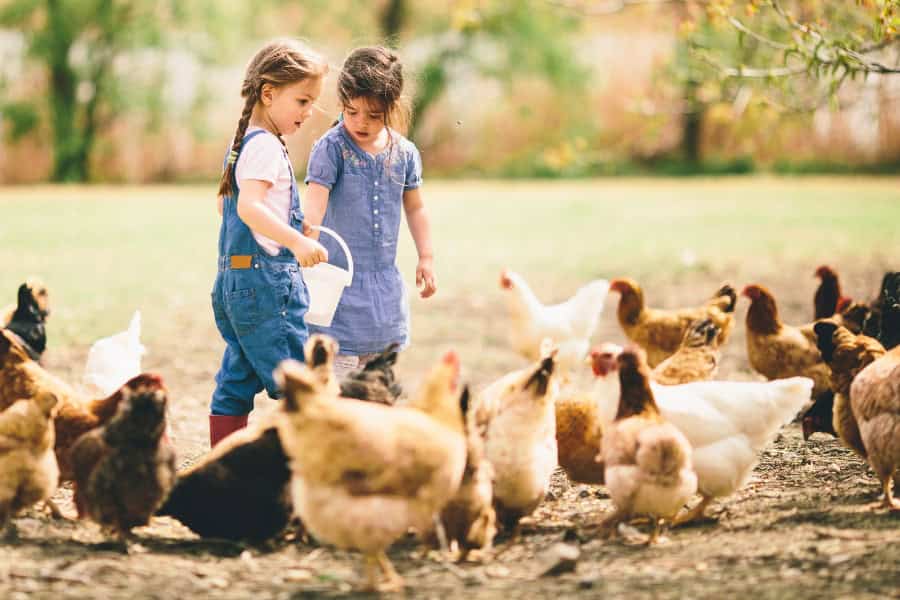
Ecowiser’s aims to burst myths about pet diets. Here are 4 shocking chicken food myths that you must be steered clear of:
Myth 1: Chickens Can Eat Anything
Fact: While chickens are known to be quite the omnivores, not everything is safe for them. Certain foods can be toxic, such as avocado pits and skins, chocolate, and raw beans. Feeding chickens these harmful items can lead to severe health issues or even death. Always research before introducing new foods to your flock.
Myth 2: Bread is a Good Staple for Chickens
Fact: While chickens can eat bread, it shouldn’t be a staple in their diet. Bread lacks essential nutrients that chickens need to thrive. It’s high in carbohydrates but low in protein and vitamins. Instead, focus on a balanced diet of grains, vegetables, and specially formulated chicken feed to ensure they receive proper nutrition.
Myth 3: Chickens Can Digest All Types of Grains Easily
Fact: Not all grains are created equal when it comes to chicken digestion. Whole grains like wheat and corn are commonly fed to chickens, but some grains, like uncooked rice, can cause digestive issues. Chickens have a crop and gizzard to help grind their food, but providing grains in a form they can easily digest is crucial for their health.
Myth 4: Feeding Chickens Meat Makes Them Aggressive
Fact: Feeding chickens meat does not make them aggressive. Chickens are natural omnivores and can benefit from protein sources like cooked meat or insects. However, it’s essential to avoid raw or spoiled meat to prevent health issues. Properly incorporating protein into their diet can lead to healthier, more productive chickens.
Understanding the truth behind these common myths can help you provide a healthier, more balanced diet for your chickens. Always stay informed and consult reliable sources to ensure the well-being of your feathered friends.
Summing Up!
So, can chickens eat grapes? Yes, they can!
Grapes can be a safe and enjoyable treat for chickens when fed in moderation. Incorporate grapes into your chickens’ diet as an occasional supplement to their balanced feed and foraged diet. Monitor your chickens for any potential issues and adjust the serving size if necessary. By following these guidelines, you can provide your chickens with a nutritious and delicious treat that they’ll love.
Chickens can be sensitive birds but with a little bit of care, you can surely build a healthy habitat for these beautiful creatures in your backyard. Just remember to feed them right.
Ready to dive into the world of conscious living? Get started here.
Frequently Asked Questions (FAQs)
1. Can I give my chickens grapes?
Yes, chickens can eat grapes. Grapes are safe for chickens to consume, and they can enjoy all varieties, including green, red, and black grapes. However, it’s essential to offer grapes in moderation as part of a balanced diet.
2. Are there any fruits that chickens can’t eat?
Yes, there are fruits that chickens should avoid. Avocado, chocolate, and onions are toxic to chickens and should be avoided at all costs. Additionally, processed foods, salty snacks, and sugary treats are not suitable for a healthy chicken diet and should be kept away from them.
3. Can chickens eat grape seeds and skins?
Yes, chickens can eat grape seeds and skins. Grape seeds are safe for chickens to consume, and they can be a good source of nutrients. However, it is essential to ensure that the grapes are washed thoroughly to remove any pesticides or chemicals that may be present on the skin.
4. Do chickens eat bananas?
Yes, chickens can eat bananas. Bananas are a nutritious and enjoyable treat for chickens. They are a good source of essential vitamins and minerals, including potassium, which can help support their overall health. Bananas can be given to chickens as a tasty snack, but as with any treat, they should be offered in moderation.
5. What food is good for chickens?
A balanced diet for chickens includes grains, seeds, vegetables, fruits (such as grapes in moderation), and insects. These foods provide essential nutrients like protein, vitamins, and minerals necessary for their overall health and well-being.


